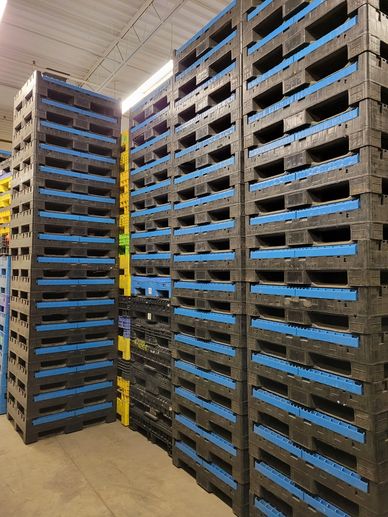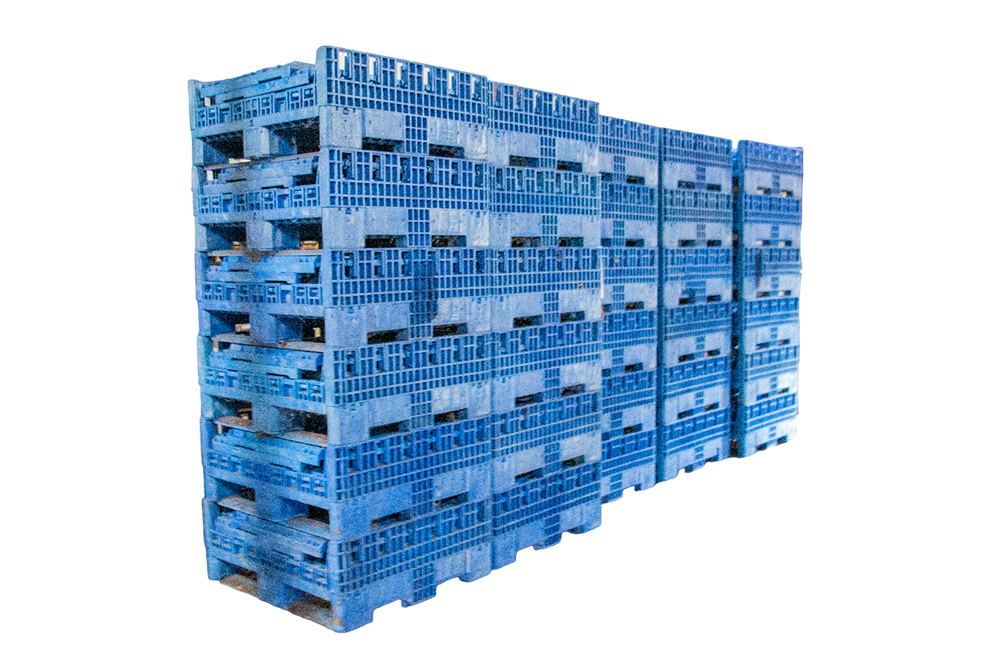Why used bulk containers are efficient for large-scale material management
Why Mass Containers Are Essential for Lasting and Cost-efficient Transportation
Bulk containers play an important role in contemporary logistics. They promote the effective movement of huge amounts of goods, consequently optimizing transportation processes. This method not just minimizes prices yet likewise decreases ecological influence via reduced discharges and waste generation. As markets look for more lasting techniques, the fostering of mass containers is coming to be progressively considerable. What ramifications does this change hold for future logistics and supply chain administration?

The Advantages of Making Use Of Mass Containers in Logistics
Mass containers change logistics by enhancing performance and sustainability. These containers permit the transport of big quantities of goods in a single trip, significantly minimizing the variety of trips required. This not just simplifies procedures however likewise lessens labor expenses connected with handling, loading, and unloading. On top of that, bulk containers are created to maximize room use within transport cars, making sure that more items can be delivered concurrently.
The standardization of mass containers also streamlines the logistics procedure. With uniform measurements, they can be conveniently piled and stored, bring about boosted warehouse management. Bulk containers usually include sturdy products that safeguard contents from damage during transportation, thus lowering item loss and increasing total reliability. As a result, companies can experience boosted supply chain efficiency, ultimately bring about raised productivity and customer contentment. This combination of factors makes mass containers a critical possession in modern logistics.
Ecological Effect: Reducing Waste and Carbon Impact
As sectors increasingly prioritize sustainability, the fostering of mass containers has become a key method for reducing waste and lowering carbon footprints. These containers lessen the use of product packaging products, such as boxes and plastic, thereby significantly lowering total waste generation. By combining deliveries, bulk containers enhance transport efficiency, enabling for even more items to be carried per journey. This decrease in journeys straight associates with lower greenhouse gas emissions, adding to a smaller sized carbon footprint.
Moreover, bulk containers can frequently be reused or recycled, better mitigating environmental influence. The resilience of these containers warranties they can stand up to multiple transport cycles, reducing the demand for single-use choices. used bulk containers. By simplifying logistics and advertising efficient resource usage, mass containers not only support sustainable practices yet additionally encourage industries to align with global environmental goals. Eventually, their execution reflects a dedication to eco-friendly stewardship and liable source management
Expense Financial Savings: Exactly How Bulk Containers Lower Transportation Expenses
While numerous firms look for methods to enhance their profits, making use of bulk containers offers a substantial chance for decreasing transportation costs. Bulk containers optimize the quantity of products carried, allowing organizations to ship bigger amounts simultaneously. This performance minimizes the number of trips called for, straight reducing gas costs and minimizing labor costs related to loading and dumping.
Additionally, mass containers typically feature structured designs that enhance room use within transportation cars. This implies less voids, bring about much more reliable use readily available capacity. In addition, the durability of mass containers can lower the threat of product damage throughout transportation, making certain and lowering losses that more items get here undamaged.
Enhancing Supply Chain Effectiveness With Mass Storage Solutions
Bulk storage options play an important function in boosting supply chain performance by optimizing supply management. By consolidating goods into fewer, bigger containers, businesses can considerably lower handling costs related to constant transfers and handling. This streamlined strategy permits better tracking and administration of stock, inevitably bring about boosted operational efficiency.
Structured Stock Administration
Efficient supply monitoring is vital for optimizing supply chain operations, especially when organizations embrace bulk storage space remedies. These options enable services to keep greater supply degrees while reducing the regularity of replenishment. By combining products right into bulk containers, companies can enhance their inventory processes, reducing the intricacy related to tracking several smaller plans. This approach assists in precise supply counts and boosts forecasting precision, permitting even more educated decision-making. In enhancement, mass storage solutions simplify stockroom organization, making it simpler to find and access items when needed. As an outcome, organizations can accomplish a more efficient stock turnover price, inevitably enhancing total supply chain efficiency and minimizing the likelihood of stockouts or overstock circumstances.

Minimized Handling Costs
The execution of bulk storage remedies not just improves inventory administration yet additionally considerably reduces managing expenses throughout the supply chain. By combining products right into bulk containers, business minimize the demand for constant handling and transfer in between various storage and transportation systems. This method minimizes labor expenses connected with loading, dumping, and moving smaller sized plans. Additionally, bulk storage decreases the frequency of shipments, leading to reduced transportation prices and lowered gas intake. As an outcome, services can enhance their logistics procedures, permitting for a much more effective appropriation of resources. Eventually, reduced dealing with costs contribute to improved overall supply chain efficiency, fostering an environment that sustains both sustainability and financial practicality.

Flexibility of Mass Containers Across Different Industries
Many sectors have distinctive demands for transport and storage, bulk containers have arised as a flexible solution that satisfies a wide array of needs. These containers, ranging from huge containers to specialized containers, can suit diverse products, including granules, powders, and liquids. In the agricultural sector, bulk containers facilitate the transport of fertilizers and grains, while the food and beverage industry utilizes them for ingredients and ended see page up items. The chemical sector depends on mass containers for securely transporting harmful materials, making certain conformity with safety and security guidelines. Furthermore, building firms benefit from bulk containers for transporting aggregates and other Check Out Your URL products. Their versatility reaches numerous modes of transport, consisting of trains, ships, and vehicles, enhancing logistical effectiveness. This flexibility not only streamlines procedures throughout different markets however also advertises sustainability by lowering packaging waste and maximizing room en route. Consequently, mass containers play a vital function in modern-day supply chain monitoring.
Future Fads wholesale Container Usage and Sustainability
The future of mass container usage is progressively shaped by cutting-edge products development that boosts sustainability. Additionally, automation in logistics assures to improve procedures, decreasing waste and boosting performance. Embracing circular economic situation methods will certainly further change just how bulk containers are designed, made use of, and reused, promoting a more lasting transportation landscape.
Cutting-edge Products Advancement
As markets significantly prioritize sustainability, ingenious products development in mass containers emerges as a considerable element in boosting environment-friendly transport options. Researchers and makers are checking out eco-friendly plastics, recycled compounds, and lightweight metals to decrease ecological effect. These products not just lessen waste however likewise boost gas efficiency by decreasing the general weight of containers. Additionally, improvements in smart products, which can adjust to differing conditions, enhance the toughness and performance of mass containers. The assimilation of these innovative materials aligns with circular economy principles, promoting reuse and recycling. As the demand for lasting techniques expands, the growth of such products will certainly play a crucial duty fit the future of mass container use in logistics and transport.
Automation in Logistics
Substantial innovations in automation are positioned to change logistics and the utilization of mass containers, boosting sustainability in transport. Automated systems, consisting of drones and independent cars, are enhancing the motion of bulk containers, decreasing the reliance on typical fuel-powered transportation. These innovations optimize routing and filling processes, boosting and reducing vacant miles gas performance. In addition, automated stock management systems boost monitoring and tracking of bulk containers, ensuring far better source allowance and minimized waste. The integration of the Net of Points (IoT) allows real-time information analysis, enabling positive decision-making that aligns with sustainability objectives. As automation proceeds to evolve, it is anticipated to drive better technologies wholesale container usage, inevitably supporting even more lasting logistics practices and lowering the environmental impact of transport.
Circular Economic Situation Practices
Developments in automation are establishing the phase for an extra incorporated strategy to circular economic climate methods in the domain of mass container use. As sectors progressively welcome sustainability, mass containers are being developed for durability and reusability. This shift not just minimizes waste however additionally enhances source performance. Companies are taking on techniques such as closed-loop systems, where utilized containers are accumulated, refurbished, and reintroduced right into the supply chain. Furthermore, wise innovations track container life process, facilitating much better monitoring and reducing environmental effect. The cooperation between makers, logistics suppliers, and end-users is essential in establishing requirements for lasting container usage. refurbished bulk containers. Future trends suggest a growing focus on products that are eco-friendly and recyclable, additional reinforcing the round economic situation's concepts in mass transportation
Frequently Asked Inquiries
What Materials Are Mass Containers Usually Made From?
Mass containers are usually constructed from long lasting materials such as high-density polyethylene, cardboard, useful source steel, and aluminum. These products supply versatility, protection, and stamina, making them appropriate for delivering numerous goods in different markets effectively.
How Do I Select the Right Dimension Bulk Container?
Picking the appropriate size bulk container includes assessing the quantity of materials to be transported, thinking about taking care of equipment compatibility, and appraising storage area demands. Appropriate dimension warranties efficiency in transportation and reduces waste during shipment.
Are Bulk Containers Reusable or Recyclable?
Bulk containers are typically recyclable, created for several trips, enhancing sustainability. Numerous can also be reused, relying on the products used. Choosing recyclable alternatives additionally sustains environmental objectives and lowers waste in transportation methods.
What Security Laws Put On Mass Container Transportation?
Safety and security policies for bulk container transport consist of conformity with the Division of Transport guidelines, appropriate labeling of harmful materials, structural honesty evaluations, and adherence to weight limits to guarantee secure handling and protect against accidents during transit.
Just How Can Services Transition to Making Use Of Bulk Containers Properly?
Businesses can transform to bulk containers by evaluating existing logistics, training staff on handling, purchasing appropriate tools, enhancing inventory monitoring, and working together with vendors to guarantee compatibility and performance throughout the supply chain.
As markets increasingly focus on sustainability, the fostering of bulk containers has arised as an essential approach for minimizing waste and lowering carbon footprints. By settling materials right into mass containers, business can simplify their stock procedures, reducing the intricacy associated with tracking multiple smaller bundles. As sectors significantly focus on sustainability, innovative materials growth in mass containers arises as a considerable aspect in improving environment-friendly transport remedies. Automated systems, consisting of drones and autonomous cars, are improving the motion of bulk containers, minimizing the dependence on conventional fuel-powered transportation. In addition, automated supply monitoring systems boost monitoring and surveillance of mass containers, making certain far better source allotment and reduced waste.